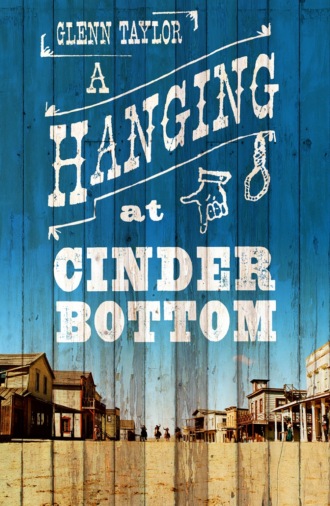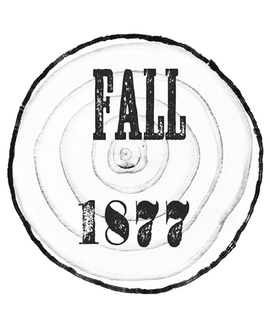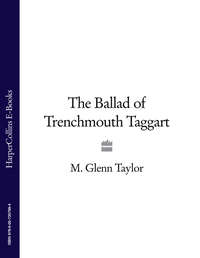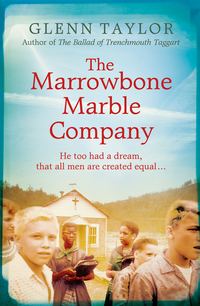
Полная версия
A Hanging at Cinder Bottom
Rutherford grit his teeth and told the driver to see to his buggy whip.
Abe sat on his coffin and swayed in time with the rusted wagon springs. His head knocked the barrel of the long short gun, but he did not much feel it. His ears caught the echo of his woman’s din, but he did not much hear it. His eyes looked ahead to the waiting gallows, but he did not much see it.
The people had amassed there, four thousand strong. Most had traveled from Mingo or from Mercer. They’d caught wind the day before and made haste to see the show. They stood upon a plot northeast of Elkhorn Creek, a flat patch where a house of ill fame had once held sway as the unofficial boundary to Cinder Bottom, Keystone’s red-light district. Now the land had been carved and leveled by seventeen mule teams in preparation for a new switchout and tipple. The people filled it up and stood on their wagons. They covered the surrounding hillsides, slipping and lending one another a hand. They waited fifty deep in line for hot roasted peanuts at five cents a bag, and they pressed against the barbed wire fence that circled the scaffold stage.
The gallows platform was wide and high, its ladder bearing thirteen steps and its side-by-side traps triggered by a singular lever. It had been built by a stranger. An Italian master carpenter with the straight-ahead eyes of a clergyman who called himself Signore Buonostirpe. He’d walked into Judge Beavers’ office early Thursday morning and proclaimed, “I make catafalco. I make for nothing.” He had a letter from George Maledon at Fort Smith Arkansas which read: This man has a gift from God, and it is to build, completely gratis, the most beautiful killing mechanisms you’re likely to see. Buonostirpe said he believed the guilty should pay with their lives. He wanted only to have his choice of timber and to work in solitude. He was granted both, and in two days’ time, he’d built the custom long-drop scaffold. The beams were spruce. The encased bottom, sweetgum. It was costly to panel the high pillars, but encased bottoms were customary since 1901 when Black Jack Tom Ketchum had been decapitated by a long-drop gallows in New Mexico.
Four policemen hopped from the surrey and cleared an entrance at the fence gate. It took some time. The people were thick, and when they parted, they pressed against one another in a ripple. The wagons rolled inside, and the gate was latched behind. Abe and Goldie stood from their coffin tops and waited.
The officers toted stepladders to the rear of each wagon. Rutherford and the skinny preacher descended like the rest. Reed did not. He unhitched a key ring from his belt and bent at Goldie’s side.
“What are you doing?” Rutherford called up.
Reed said, “We undo their ankles now. Less you want to carry Baach up that pitch.”
Rutherford looked at the stairs awaiting. He mumbled for Reed to hurry on and do it.
A procession toward death commenced as a new vendor began to call out, “Abe and Goldie’s picture, twenty cent! Last chance!”
Folks patted their pockets and fished for coins.
“They’ll never have another one took,” the man called.
They ascended the stairs single file.
The rain picked up again and the beaten ground troughed under the feet of the people. They listened to the rain against their shoulders. They were quiet and uncertain. Those who knew about rain and ground asked how in God’s name the earth could be so wet after having been so long dry.
On the platform, the players took their places. Chief Rutherford, officer Reed, news reporter, preacher. The court stenographer was given a straight-back chair too small for her frame, but she took her seat and produced a leather-bound book and fountain pen. She held them at the ready, her fat hand trembling.
Rutherford moved Abe to his spot on the drop door. Reed followed suit, escorting Goldie to her own square. The two ropes dangled behind them, nooses nearly touching the platform floor.
The preacher took his place in front of the condemned and spoke. “These two, convicted of the worst crime, are standing on the line of eternity and time.”
A loose conglomerate of horses began to whinny, and babies cried as their mothers held them high to witness.
The preacher preached on. “Their immortal souls are about to enter the unseen world, where the years are as the sands of the sea, as the leaves on the tree.”
His hands were crossed over his Bible when he stepped to the back of the platform.
Rutherford nodded to Reed, who in turn nodded to Goldie that she could make her speech.
Rutherford had proclaimed the night before that when it came to hangings, speeches were customary and that ladies spoke before gentlemen.
The people waited for Queen Bee to speak.
It had been said of Goldie that you could ask her what time it was and she’d tell you how to build a clock. She could dress a man down in two sentences. But on this day, upon being asked to speak, she said nothing. She looked at Abe, who looked at the square beneath his polished shoes. She looked to the sky above. The dark gallows crossbeam split the dirty clouds. She looked back at the people, whose numbers and expanse took her breath. She’d not seen so many together, and when she let her eyes blear, it was as if the people were a wide gray skin on the land. She took note of the mothers in the crowd, the ones holding their fat babies aloft, and how those little ones shut their eyes against the rain and opened them again, looking askance on the world before them, and she said, too quiet to be heard by any but those on the stage, “Children ought not be out in this choke damp rain.”
Rutherford told Abe to make his speech.
The stenographer kept a good pace. Tiny impels condemned to speak, she wrote.
Abe cleared his throat. “My name is Abe Baach,” he said. “I was born right here in Keystone on the ninth of January in the year 1880.” The people listened. “Up to April, I had not stepped foot in this place for seven years.” He looked at them. “Most of you people know me, even if you act like you don’t.” His voice carried clear to those in the trees. “My mother is Sallie Hood of the Burke Mountain Hoods. My Daddy is Al Baach.” Men from outlying counties yawned and checked their pocketwatches. “Maybe you drank something once upon a time in his saloon on Wyoming Street,” Abe said. “I served plenty of you, and so did my brothers Jake and Sam.”
Two dogs got into it at the foot of a hillside birch tree. Their throated snarls turned the heads of most in the crowd until a girl kicked their snouts apart and the smaller one ran for cover under a tall horse.
Abe pointed his shackled hands at an old man who stood at the fence with his knotty fingers intwined. “Right down here is ole Warts Wickline,” Abe shouted. “When I wasn’t but knee-high, I’d set up on the bartop and play dishrag peek-a-boo with this gentleman right here in front of me.”
“Handsome baby,” Warts Wickline said. His neck was covered in skin tags of varying size and shade. “He done a dance up there, stuck out his little hand for a cent piece.” None could hear him but those in proximity, and the crowd along the edges murmured and moved. The old man kept on. “Stuffed your britches with them pennies didn’t you,” he called up to Abe. “We called you Pretty Boy Baach back then.”
Abe nodded his head. “I remember,” he said.
The whistle of the westbound noon train came faint on the air. It was nine minutes behind schedule. The rain slowed.
“There’s a good many of you that want me to take out my cards and show you a trick or two,” Abe called out. “There’s a good many more wants to know the truth of who does the killin around here and who fires their gun in defense.” He held up his wrists. “It’s hard when you’re shackled, but I’ll oblige.” And he opened his clasped hands, and in them he held a fresh deck.
Rutherford’s stomach made a watery sound. He didn’t know whether to shit or go blind.
Abe split the deck’s seal with his thumbnail and said, “At the end of it, if the law is still standing behind me, he can by God yank the handle.”
There was a rumble among them then. Some had had enough of this talk from a convicted criminal. “Go on and stretch his neck,” somebody called. One woman yelled that Goldie was a whore. Another man advised not to listen to a half-Jew swindler such as Abe. Others leaned to the ones in front and asked what it was that ole Warts Wickline had said, and when told, they passed it on to another who’d inquired, and so it spread, and there were those then uncertain about the hanging of such a beautiful young woman and a handsome man who’d once been a boy who peek-a-booed and danced for a britches penny. Those uncertain knew themselves to be good then, and they leered at those about who were drouthy for spilt blood.
Reed leaned to Rutherford and whispered, “I best put them ankle irons back on.” Rutherford nodded, and Reed knelt before Abe and set to work.
“Yank the handle!” a skinny boy said.
An old woman said no. She said the condemned ought to be able to say his piece.
The people were stirring, talking loud over the slacking rain.
Rutherford had seen enough. He bent to the nooses where they hung and gathered their lengths in his fist, and as he did, a tingling commenced in his fingers and toes, and thereupon Abe let loose a booming invocation which carried to the scant trees on the ridge and beyond. “I’ll tell the truth before I die,” he roared, “or I’ll walk out of hell in kerosene drawers and set the world on fire!”
Rutherford was still bent at the waist when he let go the rope lengths. He wobbled, then dropped to his knees. When his face hit the boards, there came from his backside a mighty gust. It escaped him in a long and steady rush, a flatulence known only to the leprous gut, a ragged slap of wind that carried forth without cease for a full fourteen seconds.
When it was finished, Abe said, “Amen.”
So short was Rutherford’s height that those up close had not seen him go down, for the gallows was a steep-pitched endeavor. But they had heard the call of his marsh gas, and they were confused. Those farther away thought maybe he was fiddling with the shackles, or praying.
The stenographer’s hand had ceased to tremble. She wrote in her bound book with furious tranquility: Tiny falls on face, farts in carefree fashion. Condemned remarks “Amen.”
The rain quit and the people were again quiet.
Abe tossed the deck to Goldie. They played shackled catch as if it were a common game. She winked at him and pulled back the flaps and dropped the wrapper to the boards. The cards wore heavy varnish.
The sun came free of the clouds then, and the people looked skyward, and there was only the north-born sound of the tardy noon train’s wheeze. The engine was not yet fully stopped at the station when men began to jump from inside the empty coal hoppers. They hit the hard dirt beside the railbed and rolled and got to their feet quick. They ran on wrenched ankles, headlong into the people staring dumb at the heavens.

Конец ознакомительного фрагмента.
Текст предоставлен ООО «ЛитРес».
Прочитайте эту книгу целиком, купив полную легальную версию на ЛитРес.
Безопасно оплатить книгу можно банковской картой Visa, MasterCard, Maestro, со счета мобильного телефона, с платежного терминала, в салоне МТС или Связной, через PayPal, WebMoney, Яндекс.Деньги, QIWI Кошелек, бонусными картами или другим удобным Вам способом.



